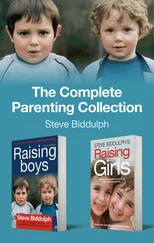Calmness is made up of certain actions; breathing deeper, dropping your shoulders, settling your muscles, feeling your feet strongly planted on the ground, focusing your thoughts on the job in hand in a steady easy way, and not going off into panicked thoughts. Even just counting three or four breaths, in and out, will slow your heartbeat and calm your mind down. Calm people are actually doing these things automatically; when an emergency strikes they intentionally calm themselves more in order to counter the tendency to panic and do the wrong thing.
Self-regulating your level of emotional arousal is an incredibly valuable skill for life. All you have to do is notice, am I calm? If not, breathe a couple of times consciously, feel your feet on the ground, and notice how, as the last burst of adrenaline clears away, the calmness response starts to kick in. Practise this for a few days, and soon the natural appeal of calmness will pull you more and more to that peaceful and steady place. Everything is better – the taste of food, the scent of flowers, the feel of the water in your shower, warm on your skin. You will find that time slows down, and you can think more in the pause before you open your mouth. And that has real benefits!
Feeling okay in the world is the first lesson you teach your baby girl. ‘You are loved and precious, I am here for you, and everything is okay’. A frightened or lonely baby won’t learn to calm herself if she is just left to cry – this is a common misunderstanding. She will go quiet eventually, but this is because of another survival pattern. ‘Nobody is going to come!’ A baby’s prolonged cries ‘in the wild’ might attract danger, so if her cries are not successful after a few minutes, the baby shuts down and becomes physiologically ‘depressed’. If parents are unresponsive – through suffering untreated postnatal depression, or being drunk or stoned, or just not caring – and if this happens often enough, the baby decides that ‘my efforts don’t have any effect on others’. This pattern will become part of how she responds to difficulty in life. It is called ‘learned helplessness’.2
It’s not a pattern you want your child to have, because she will lack a sense of mastery or hope in difficult situations. ‘Depression’ is often misunderstood – it is simply an ability of the human body to shut down, from ancient times when we had to sit out bad weather or endure long winters of cold and dark. At such times, with little food about and no energy to catch it, moving little, eating little and doing little was the best way to survive. But the depression response can easily become overdeveloped. Teaching depression to a child by ignoring her is not going to help her. She may lie still, but she is actually very unhappy.

© Pavels Rumme/Shutterstock
There is a middle road here; especially when getting babies to sleep, which can be an important part of parents’ survival. Sometimes a baby in her cot will make sounds, trying to bring the adults to play with her after she’s been put to bed. It’s fine to let her whinge and whine a little as part of her giving up on ‘game time’ and letting sleep take over (especially when mum or dad is totally knackered and just needs a rest), but if the whingeing turns into full-voiced distress, that’s not good. She needs calming and settling. The caring bond between you is endangered, and she needs to know you are there. (In the notes you will find some good reading suggestions on how to get more sleep for your baby, and for you, without using harsh methods to do so.)
You Also Have to Excite Your Baby!
After all this talk about calmness, it’s important to remember the opposite message too: we don’t always want our babies calm . Babies and toddlers also need to learn to go into higher states of excitement, to increase their emotional range and enjoyment. From time immemorial, parents and siblings will just naturally tickle, tease, excite and stimulate babies. Your little girl will giggle and ‘come alive’ when you energise her in whatever way works for you – singing to her, playing peek-a-boo by hiding your face behind your hand or a magazine and popping out again. Tickles, cuddles and dancing about with her in your arms will help her coordination and body sense, but don’t do it for that reason, do it for the fun of it. Put some music on, and let yourself go!
Even the rough and tumble play that dads do with small children helps this along. Dads are notoriously prone to exciting kids by tossing them about, chasing and wrestling and swinging them around. Your daughter may get a little stressed by this, but if it is done in the right way (which you can tell by watching her face for signs of real distress, and backing off a little) she will get over it and start to giggle. Research has found that little girls who play with their dads when they are toddlers are much more stress-proof than those who had it all too safe and gentle!3
(A cautionary note, especially for dads, when a baby is little, be careful with their necks – and their body generally. A baby cannot support the weight of their head with their little neck for many months and it may flex to the point of injury or sprain. Always support their head and neck firmly as you move them about.)

© Stocklite/Shutterstock
There is something else even more important: setting an example of fun. Your daughter learns most by watching you. If you are happy, exuberant, silly and fun with her at those times that it is appropriate (i.e. not when driving the car), then her capacity for being happy will grow. If you are friendly to people you meet, enjoy getting your clothes on, sing while you shower, are kind to people in shops or in the street, speak well of people, get cross when you see something unjust or wrong, then your daughter will be taking in and making these attitudes her own, from a surprisingly young age.
It’s worth checking up on this – especially for mums, who are the number one role model for their daughter’s whole approach to life. Spend a day having a close look at yourself; do you frown, stress, grump and hurry your way through life? If that is so, being the mother of a newborn little girl might make you want to change that.
Many of us today feel unprepared for parenthood. A hundred years ago, most families had seven or eight children and their homes were noisy and crowded places, but often very happy ones. Everyone grew up with babies and toddlers around them and knew how to handle them. Today it’s very different. One study found that one-third of new parents have never held a baby before they get their own!
Luckily our hormones help with this inexperience. New mothers’ bodies flood with a hormone called prolactin. If you are lucky and can breastfeed your baby, then prolactin goes much higher in your bloodstream and makes you feel dreamy and slowed down. It helps you to focus and be there for your child. Other hormones help too; when you hug your baby, or your partner or a friend hugs you, the hormone oxytocin (the love hormone) makes you feel contented and settled.
Oxytocin is a remarkable hormone; it is released when we have an orgasm, it is released when we greet a friend, and when we eat food with someone, sitting together at a table, it increases in our bloodstream. At birth, if it’s a relaxed environment and we feel safe, it floods into us. You need all the oxytocin you can get! When people talk about bonding, it’s oxytocin at work. People who did not get enough love, and therefore enough oxytocin, often can be found seeking that satisfaction in other ways – through fame, doing drugs, compulsive sex, shopping, stuffing our face with unhealthy food. Or writing books!
Читать дальше














